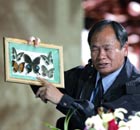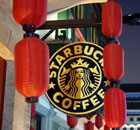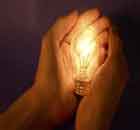Society
Traffickers 'did not know it was wrong'
By GUO RUI ANd WANG QIAN (China Daily)
Updated: 2010-03-05 07:18
 |
Large Medium Small |
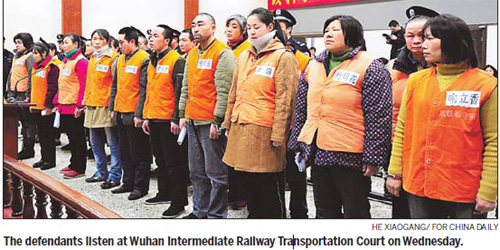
Boys priced at 40,000 yuan, girls at 20,000
WUHAN: A total of 23 people accused of involvement in one of the country's biggest-ever child trafficking cases stood trial on Thursday for selling 49 babies over four years from Southwest China's Yunnan province.
Lu Danjun, an official at the Wuhan Intermediate Railway Transportation Court, told China Daily that the trial, which began on Wednesday, was spread out over two days because of the large number of defendants. The trial ended Thursday without a verdict.
In June 2009, police in Wuhan rescued 29 children in a nationwide crackdown on the trafficking of children and most of the parents have not yet been located.
Prosecutors allege that Yu Lixiang, one of the 23 suspects, participated in selling 31 babies, including three who died while being transported.
Testimony also revealed that one of the traffickers on trial had been trafficked herself. Yu and her sister, Yu Xiaofen, were trafficked from their hometown in Yunnan to North China's Hebei province as teenagers and were forced into marriage. Yu Lixiang has married four times and has four children.
About 10 years ago, Yu Lixiang's brother, Yu Xiaoxin, went to Hebei to find his sisters and took with him two infants to sell. Yu Lixiang and Yu Xiaofen found child trafficking was a good way to make money and began "their business," according to the indictment by the prosecutors.
Yu Lixiang told Wuhan-based Changjiang Times that she cared about nothing after years of an abnormal life.
From March 2005, Yu Lixiang and her husband allegedly trafficked dozens of babies from Shizong county in Yunnan to Hebei province. Later they formed a baby trafficking gang with relatives and friends.
In May 2009, police at Wuchang railway station rescued 29 children and detained 18 suspects in an eight-day campaign targeting trains pulling in from the city of Kunming, Yunnan province.
According to the prosecutor, between March 2005 and July 2009, the gang trafficked 49 children to Hebei and Shanxi provinces.
The gang would buy a boy for 13,000 yuan ($1,900) to 20,000 yuan and a girl for 5,000 yuan to 14,000 yuan in Yunnan. They sold boys for about 40,000 yuan each and girls for 20,000 yuan in Hebei, the indictment said.
Chinese babies, especially boys, from poor and remote areas are sometimes sold to more prosperous people. Some older children are also sold to gangs.
Under Chinese criminal law, child traffickers face punishment ranging from five years in jail to the death sentence.
The buyer of a trafficked child can be jailed for a maximum of three years.
The Ministry of Public Security said earlier about 3,000 cases of women and child abductions are investigated each year in the country.
However, the website humantrafficking.org, a resource for combating human trafficking, estimates that the number of victims of human trafficking ranges from 10,000 to 20,000 each year on the Chinese mainland, and 90 percent are women and children from Anhui, Henan, Hunan, Sichuan, Yunnan and Guizhou provinces.
Chinese police freed 3,455 children and 7,365 women during a nine-month national campaign against human trafficking that was launched in early April 2009, according to official statistics.
Police said they will speed up the construction of a DNA database, including DNA from abducted children and their parents, to combat child trafficking, said Huang Zuyue, a deputy director of the ministry's criminal investigation bureau.
|
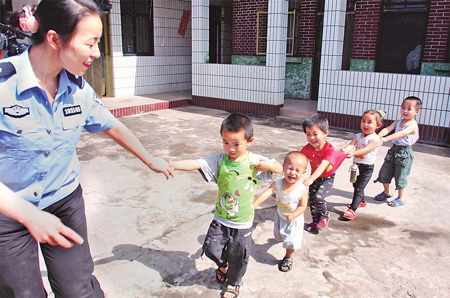 A Wuhan police officer entertains children rescued from the trafficking gang in Handan city, Hebei province, in this file photo.[He Xiaogang/China Daily] |






